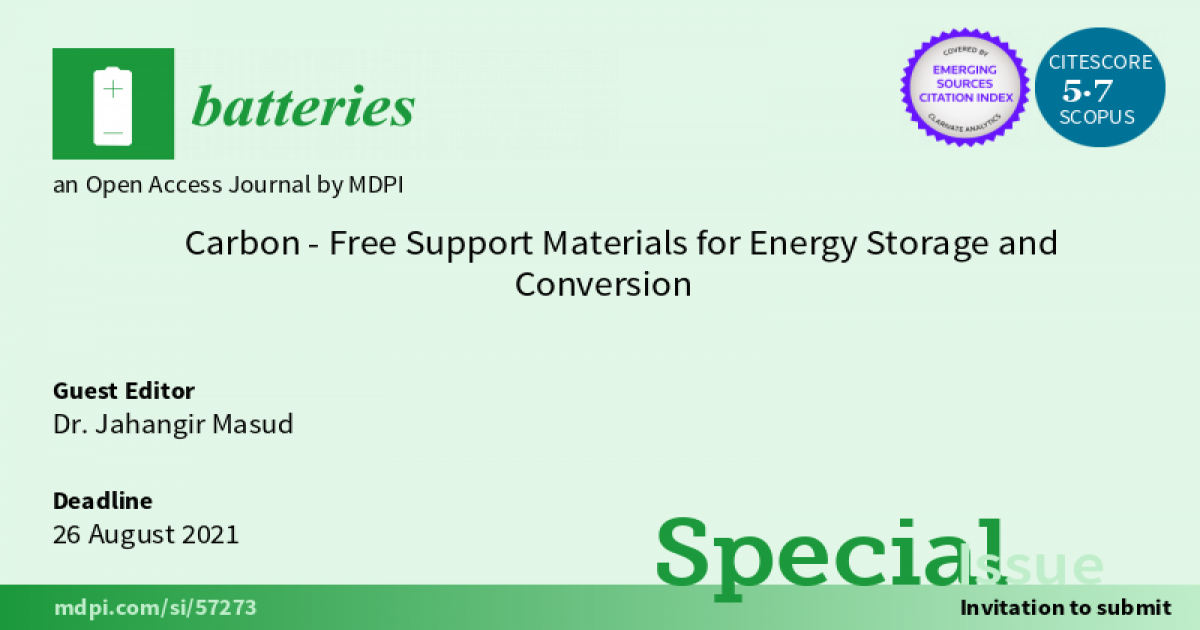Carbon-Free Support Materials for Energy Storage and Conversion
A special issue of Batteries (ISSN 2313-0105).
Deadline for manuscript submissions: closed (26 August 2021) | Viewed by 1182

Special Issue Editor
Interests: energy storage and conversion; rare earth elements extraction; corrosion
Special Issues, Collections and Topics in MDPI journals
Special Issue Information
Dear Colleagues,
Carbon black is the most commonly used catalyst support for electrocatalysts (mainly PEM based fuel cells) due to its high surface area and high conductivity. However, under certain automotive fuel cell operation conditions (start–stop), carbon can corrode rapidly, resulting in significant and irrecoverable loss in performance. To address this issue, it is desirable to explore non-carbon supports with high conductivity, high surface area, and high corrosion resistance under fuel cell operating conditions.
In this Special Issue of Batteries, we invite both fundamental and applied research original articles, letters, as well as review and feature articles and perspective views on the technological developments and realization of various supports materials of electrocatalysts for energy storage and conversion devices. Gathering cutting-edge knowledge and the latest experience will contribute to the advancement of energy conversion and storage technology.
Topics of interest include but are not limited to:
- Fundamental issues of support materials in catalyst stability;
- All area of fuel cells catalysts based on non-carbon support materials;
- Modelling and degradation mechanism of catalysts;
- Small organic molecules (e.g., formic acid, methanol) electrooxidation based on non-carbon support catalysts;
- Non-carbon support catalyst for electrolysis (water, carbon dioxide, nitrogen reduction);
- Novel electrode materials for batteries, supercapacitors, and solar cells.
Dr. Jahangir Masud
Guest Editor
Manuscript Submission Information
Manuscripts should be submitted online at www.mdpi.com by registering and logging in to this website. Once you are registered, click here to go to the submission form. Manuscripts can be submitted until the deadline. All submissions that pass pre-check are peer-reviewed. Accepted papers will be published continuously in the journal (as soon as accepted) and will be listed together on the special issue website. Research articles, review articles as well as short communications are invited. For planned papers, a title and short abstract (about 250 words) can be sent to the Editorial Office for assessment.
Submitted manuscripts should not have been published previously, nor be under consideration for publication elsewhere (except conference proceedings papers). All manuscripts are thoroughly refereed through a single-blind peer-review process. A guide for authors and other relevant information for submission of manuscripts is available on the Instructions for Authors page. Batteries is an international peer-reviewed open access monthly journal published by MDPI.
Please visit the Instructions for Authors page before submitting a manuscript. The Article Processing Charge (APC) for publication in this open access journal is 2700 CHF (Swiss Francs). Submitted papers should be well formatted and use good English. Authors may use MDPI's English editing service prior to publication or during author revisions.
Keywords
- Carbon-free catalyst supports
- Fuel Cells
- Batteries
- Flow-battery
- Capacitors
- Water electrolysis
- Oxygen reduction reaction
- Nitrogen reduction reaction
- CO2 to value-added products
Benefits of Publishing in a Special Issue
- Ease of navigation: Grouping papers by topic helps scholars navigate broad scope journals more efficiently.
- Greater discoverability: Special Issues support the reach and impact of scientific research. Articles in Special Issues are more discoverable and cited more frequently.
- Expansion of research network: Special Issues facilitate connections among authors, fostering scientific collaborations.
- External promotion: Articles in Special Issues are often promoted through the journal's social media, increasing their visibility.
- Reprint: MDPI Books provides the opportunity to republish successful Special Issues in book format, both online and in print.
Further information on MDPI's Special Issue policies can be found here.





